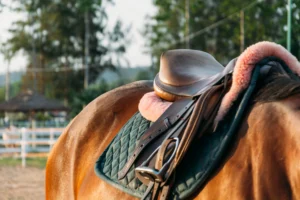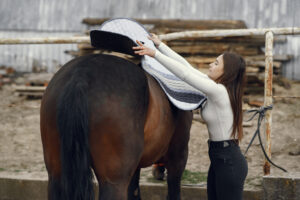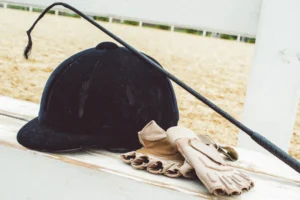Introduction
The world of equine companionship takes on a charming, pint-sized dimension when it comes to miniature horses. Standing at just 34-38 inches tall at the withers, these diminutive equines have captured the hearts of animal lovers across America. If you’re considering adding one of these magnificent creatures to your family, understanding how to adopt mini horses responsibly is crucial for both your success and the animal’s welfare.
The journey to adopt mini horses has become increasingly popular in recent years. According to the American Miniature Horse Association (AMHA), there are over 230,000 registered miniature horses in the United States alone, with thousands becoming available for adoption each year. While many people are drawn to these animals for their adorable appearance and smaller space requirements compared to full-sized horses, the reality of miniature horse ownership requires careful consideration.
“Mini horses for adoption aren’t just cute novelties—they’re a serious, long-term commitment that requires specific knowledge and preparation,” explains Dr. Elizabeth Carson, equine veterinarian and mini horse rehabilitation specialist. “Unfortunately, I see too many well-intentioned adopters make critical mistakes that lead to problems for both the humans and horses involved.”
Whether you’re exploring options to adopt mini horses from rescue organizations, considering mini horses for sale from breeders, or looking into miniature horses adoption opportunities at local sanctuaries, this comprehensive guide will help you avoid the five most costly mistakes potential adopters make. By understanding the proper approach to miniature horse adoption, you’ll be better prepared to provide a forever home for these special animals.
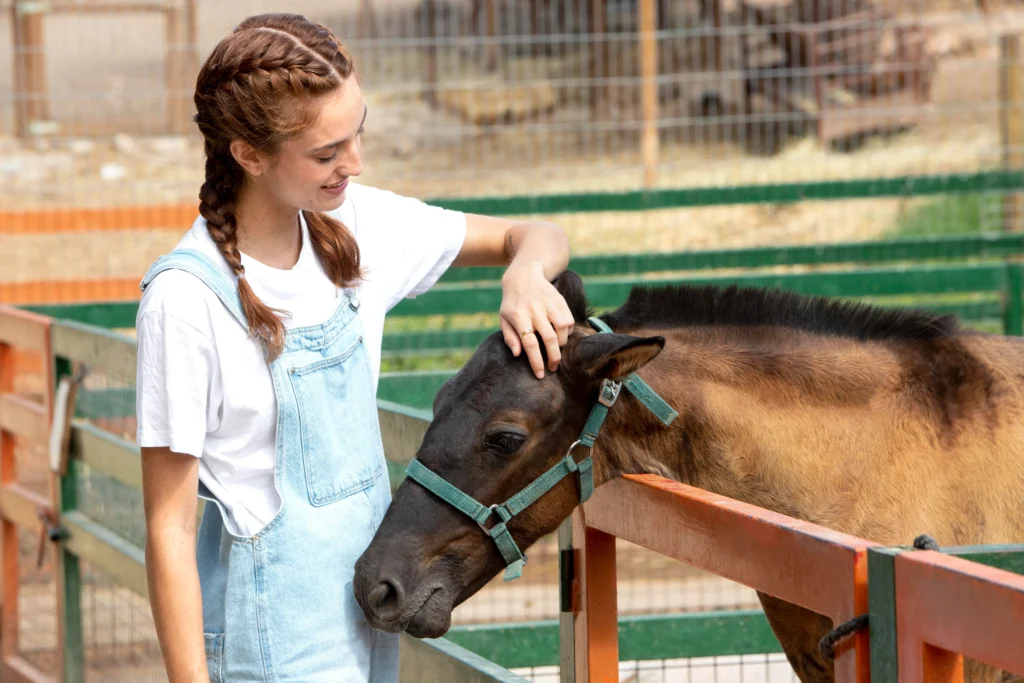
Understanding Mini Horses: More Than Just Cute Pets
Before diving into the common mistakes people make when they adopt mini horses, it’s essential to understand what these animals truly are. Miniature horses are not simply “small horses” or ponies—they are a distinct breed with specific characteristics, needs, and care requirements.
Miniature horses have been selectively bred for their small size for generations, with their history tracing back to the 1600s when they were bred as pets for European nobility. Despite their diminutive stature, miniature horses maintain many of the same physical and psychological needs as their larger counterparts. They are intelligent, social herd animals that require proper nutrition, regular exercise, social interaction, and healthcare.
When you adopt mini horses, you’re bringing home animals that can live 25-35 years—potentially a longer commitment than many dogs or cats. While their size might make them seem more manageable than full-sized horses, mini horses for adoption come with their own set of unique challenges and care requirements.
The American Miniature Horse Registry defines two categories:
- Type A: Not exceeding 34 inches in height at the withers
- Type B: Between 34 and 38 inches in height at the withers
Understanding these classifications can be important when you’re looking to adopt miniature horses, as their size may impact their suitability for your specific situation.
Mistake #1: Underestimating the Financial Commitment When You Adopt Mini Horses
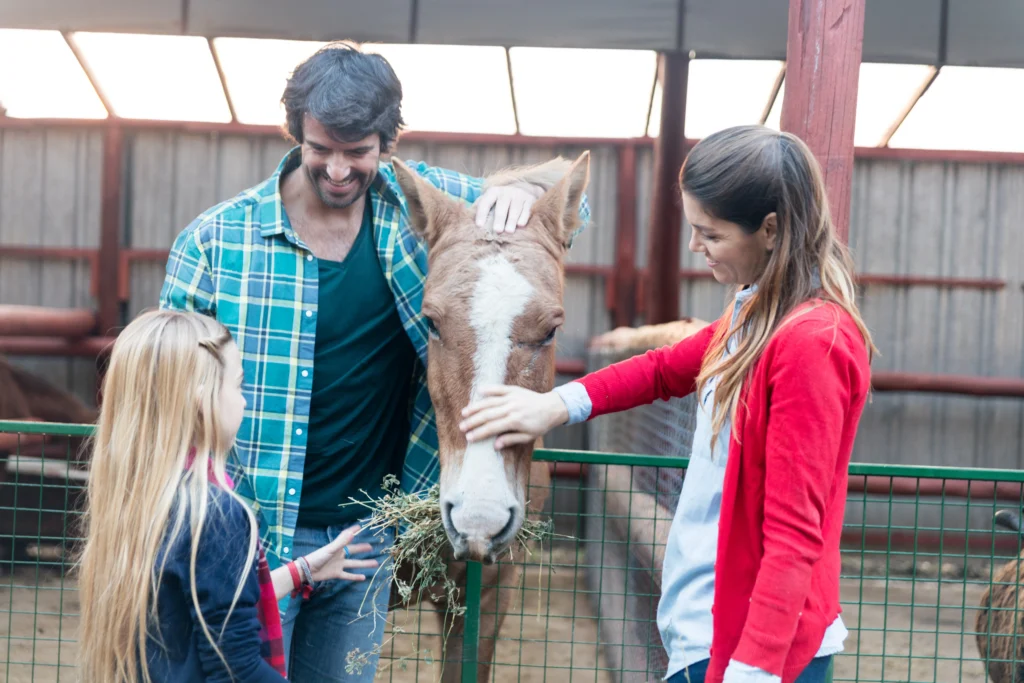
One of the most common and costly mistakes potential adopters make is underestimating the financial commitment required when they adopt mini horses. The initial adoption fee or purchase price is just the beginning of your investment.
The True Cost of Mini Horse Ownership
When you adopt mini horses, be prepared for the following expenses:
Initial Costs:
- Adoption fees: $300-$1,000+ (rescue organizations) or $1,000-$5,000+ (mini horses for sale from breeders)
- Transportation: $100-$500+ depending on distance
- Initial veterinary exam: $200-$400
- Basic equipment (halters, lead ropes, blankets): $200-$500
- Shelter construction/modification: $1,000-$5,000+
Ongoing Annual Expenses:
- Feed: $600-$1,200 annually
- Hay: $800-$1,500 annually
- Regular farrier services (every 6-8 weeks): $300-$600 annually
- Routine veterinary care: $300-$500 annually
- Dental care: $200-$400 annually
- Deworming: $100-$200 annually
- Bedding: $300-$600 annually
- Insurance (optional but recommended): $300-$500 annually
Potential Emergency Costs:
- Emergency veterinary care: $1,000-$5,000+ per incident
- Specialized equipment for health issues: $200-$2,000
Sarah Thompson, founder of Small Hooves Rescue, notes: “Many people who adopt mini horses don’t realize that while these animals are smaller, their veterinary and care costs aren’t proportionally smaller. A serious colic episode can still cost thousands in veterinary bills, just as it would for a full-sized horse.”
The Better Approach
Before you decide to adopt mini horses, create a detailed budget that accounts for both routine care and emergency situations. Many financial advisors recommend having at least $2,000-$3,000 in an emergency fund specifically for each miniature horse you adopt.
Some miniature horse adoption organizations offer financial planning worksheets to help potential adopters understand the true cost of ownership. Take advantage of these resources before making your decision. Additionally, explore equine insurance options that can help mitigate unexpected veterinary expenses.
As advised in this comprehensive pet ownership cost guide from PetsPump, being financially prepared for pet ownership is essential for both your peace of mind and the animal’s welfare.
Mistake #2: Inadequate Space and Facilities for Mini Horses for Adoption
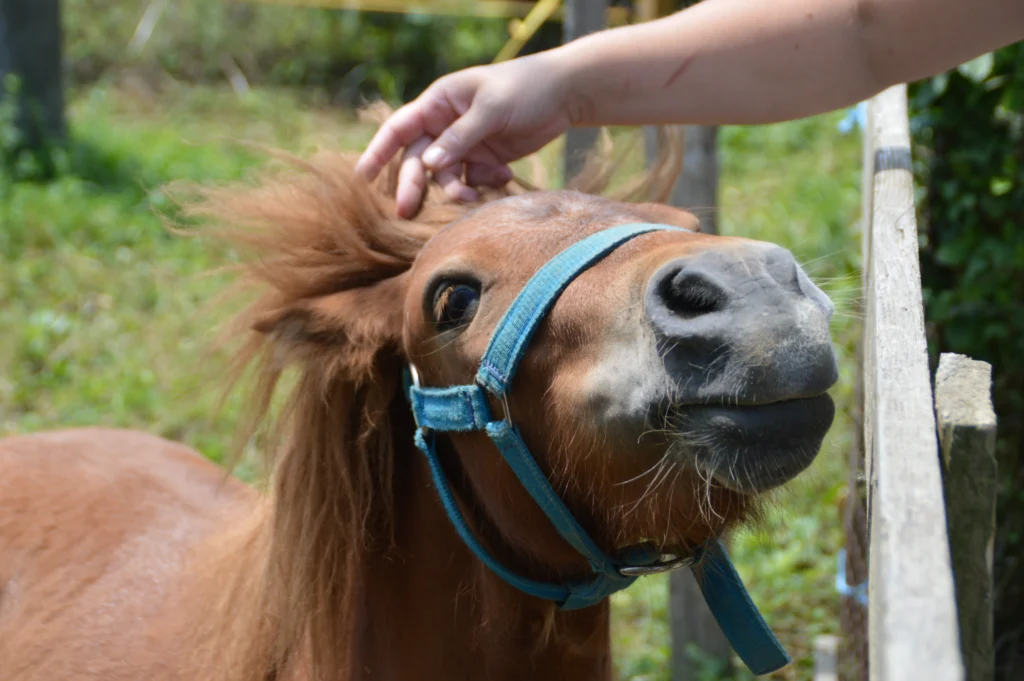
Another critical mistake is assuming that because miniature horses are small, they need significantly less space than full-sized horses. While their physical footprint is indeed smaller, mini horses for adoption still require proper facilities to thrive.
Space Requirements for Healthy Mini Horses
Miniature horses are active animals that need room to move, exercise, and express natural behaviors. Inadequate space can lead to physical and behavioral problems, including obesity, muscle atrophy, and stereotypic behaviors like cribbing or weaving.
When planning to adopt mini horses, consider these minimum space requirements:
Shelter Space:
- 60-80 square feet of stall space per miniature horse
- 8-foot ceiling height minimum
- Proper ventilation while protecting from drafts
- Safe, appropriate flooring (rubber mats over level dirt or concrete)
- Adequate drainage
Outdoor Space:
- Minimum 1/4 acre per miniature horse for turnout
- Secure fencing appropriate for miniature horses (they can squeeze through smaller spaces than full-sized horses)
- Access to shelter from sun, wind, and precipitation
- Safe vegetation (free from toxic plants)
Dr. Robert Miller, equine behavior specialist, explains: “When people adopt miniature horses, they sometimes treat them more like dogs than horses. But these are equines with the same basic needs as their larger relatives. They need space to run, proper footing to maintain hoof health, and appropriate shelter from the elements.”
The Better Approach
Before you adopt mini horses, evaluate your property carefully or consider what modifications would be necessary to create a suitable environment. Many successful mini horse owners convert large sheds into appropriate shelters or build custom mini-barns designed specifically for smaller equines.
If you’re considering miniature horses adoption but have limited space, explore boarding options at facilities that cater to miniature horses. Some mini horse adoption centers even offer boarding arrangements for adopters with space limitations.
For specific guidance on creating safe environments for small equines, check out PetsPump’s article on creating safe outdoor spaces for pets which includes valuable information applicable to miniature horses.
Mistake #3: Insufficient Knowledge About Mini Horse Health and Care
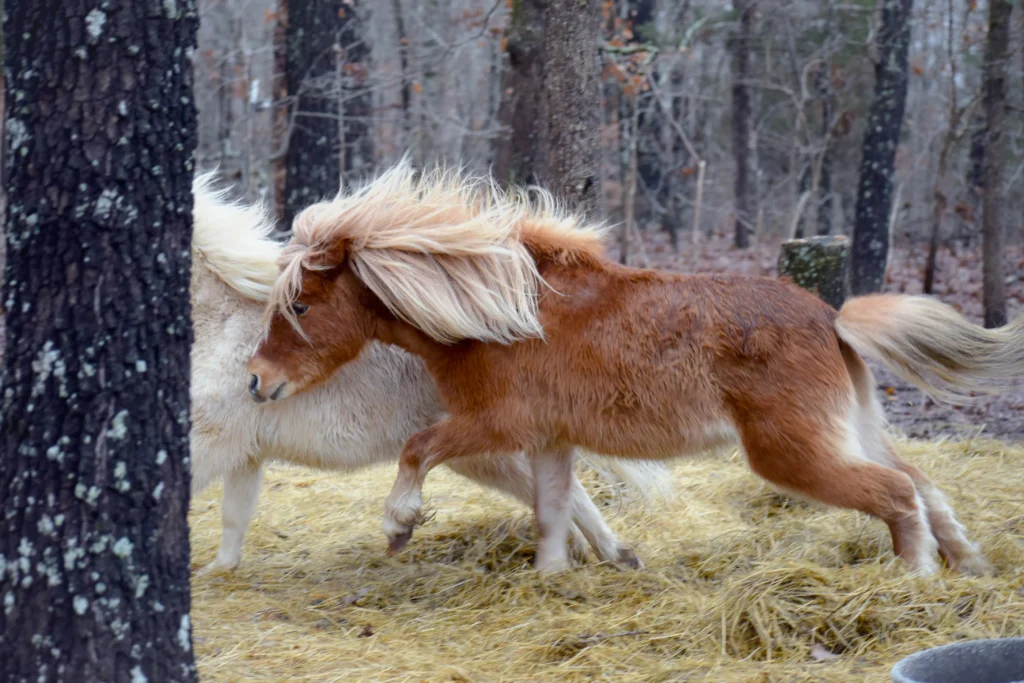
Many enthusiastic adopters pursue mini horses for adoption without first developing a solid understanding of these animals’ unique health challenges and care requirements. This knowledge gap can lead to preventable problems and reduced quality of life for the animal.
Common Health Concerns in Miniature Horses
Miniature horses are prone to certain health issues that prospective adopters should understand before they adopt mini horses:
Dental Problems: Miniature horses have the same number of teeth as full-sized horses compressed into a much smaller jaw, which can lead to overcrowding, misalignment, and retention of caps (baby teeth). Regular dental care by an equine dentist is essential.
Obesity: Perhaps the most common health issue in miniature horses is obesity, which can lead to laminitis (a painful inflammation of the sensitive laminae in the hooves), insulin resistance, and other metabolic problems. When you adopt mini horses, you must be prepared to manage their diet carefully.
Hyperlipemia: Miniature horses are particularly susceptible to this potentially fatal condition where fat is mobilized from body stores during stress or fasting, overwhelming the liver. This risk makes proper feeding and stress management crucial when you adopt miniature horses.
Difficult Births: Miniature mares can experience difficult deliveries due to foal size relative to the birth canal. Anyone considering breeding after miniature horse adoption should be aware of this serious risk.
Hoof Issues: Proper farrier care is essential, as miniature horses can develop hoof problems that affect their comfort and mobility if not regularly maintained.
Lisa Johnson, who runs a mini horse sanctuary adoption program in Kentucky, shares: “New owners often don’t realize that mini horses for adoption need specialized veterinary and farrier care. Finding professionals experienced with miniatures can be challenging in some areas, but it’s essential for proper health maintenance.”
The Better Approach
Before you adopt mini horses, invest time in education:
- Read reputable books specifically about miniature horse care
- Take workshops or online courses about miniature horse health
- Connect with experienced miniature horse owners through associations
- Identify local veterinarians and farriers with miniature horse experience
- Research local feed stores that carry appropriate feed formulations for miniature horses
Organizations like the American Miniature Horse Association offer educational resources for those interested in miniature horses adoption. Taking advantage of these materials before bringing home your mini will help you provide appropriate care from day one.
For general equine health information, the American Association of Equine Practitioners provides valuable guidance on basic horse care that applies to those who adopt mini horses as well.
Mistake #4: Misunderstanding Mini Horse Behavior and Training Needs
A potentially dangerous misconception is that miniature horses are simply cute pets that require minimal training or behavioral understanding. This mistake can lead to dangerous situations for both the horses and their handlers when people adopt mini horses without proper preparation.
Training Requirements for Miniature Horses
Despite their small size, miniature horses are powerful animals that require consistent, appropriate training. An untrained 300-pound miniature horse can cause significant injury to handlers or escape containment, creating dangerous situations.
When you adopt mini horses, you need to be prepared to provide:
Basic Ground Training:
- Haltering and leading safely
- Standing quietly for grooming, veterinary care, and farrier work
- Loading into trailers
- Appropriate ground manners
Behavioral Enrichment:
- Mental stimulation to prevent boredom
- Appropriate socialization with other horses when possible
- Regular handling and interaction
Specialized Training (if applicable):
- Driving (cart pulling)
- Therapy work
- Show ring skills
- Agility or obstacle work
James Wilson, certified equine behaviorist and trainer specializing in miniature horses, notes: “The biggest mistake I see when people adopt miniature horses is treating them like oversized dogs. They’re still horses with strong instincts and physical capabilities. Without proper training and handling, these small horses can develop dangerous behaviors just like their larger counterparts.”
The Better Approach
Before you adopt mini horses, develop a training plan:
- Assess your own equine handling experience
- Budget for professional training assistance if needed
- Research training methods specific to miniature horses
- Understand the basics of equine behavior and communication
- Connect with resources like the Miniature Horse Education Foundation
If you have limited horse experience, consider volunteering at a mini horse rescue or sanctuary before adoption to gain hands-on experience. Many miniature horse adoption process applications will ask about your experience level, and having some practical knowledge will strengthen your application.
For insights into understanding horse behavior, PetsPump offers an excellent article on interpreting animal body language that includes valuable information for prospective mini horse adopters.
Mistake #5: Choosing the Wrong Source When Looking to Adopt Mini Horses
Perhaps one of the most consequential mistakes is selecting an inappropriate source when looking to adopt mini horses. With options ranging from dedicated rescue organizations to individual sellers advertising mini horses for sale online, the source you choose can significantly impact your adoption experience and the welfare of the animal.
Evaluating Adoption and Purchase Sources
When exploring options to adopt miniature horses near me or researching where to adopt mini horses, consider these different sources:
Rescue Organizations and Sanctuaries: Dedicated equine rescue organizations often have mini horses available for adoption that have been rehabilitated, evaluated for health issues, and often received basic training. These organizations typically conduct thorough adoption screening and offer post-adoption support.
Mini Horse Adoption Centers: Some facilities specialize specifically in miniature horse rescue and adoption, with staff experienced in the unique needs of these animals. These centers often provide valuable education and support for new adopters.
Miniature Horse Breeders: Reputable miniature horse breeders can be appropriate sources for healthy, well-socialized animals, though the costs will typically be higher than adoption fees. Quality breeders prioritize health, temperament, and conformation over simply producing cute foals.
Auctions and Online Marketplaces: These venues present the highest risk for both buyers and animals. Miniature horses at auctions may have undisclosed health or behavioral issues, and little is typically known about their history or care requirements.
Rebecca Martinez, director of Little Hooves Rescue Network, warns: “We regularly see the aftermath when people impulsively acquire mini horses for sale from questionable sources. The horses often come with undisclosed health issues, behavioral problems from mishandling, or genetic conditions that could have been avoided with proper research.”
The Better Approach
When searching for mini horses for adoption, follow these guidelines:
- Research potential sources thoroughly, checking reviews and asking for references
- Visit the facility in person when possible before committing to adopt a mini horse
- Ask detailed questions about the horse’s health history, behavior, and any special needs
- Be wary of situations where you cannot meet the horse before adoption or purchase
- Verify that adoption contracts and health guarantees protect both you and the animal
Reputable sources for those looking to adopt mini horses include:
- American Miniature Horse Association Rescue Programs
- Miniature Horse Rescue Directory
- Equine Welfare Alliance Rescue Listings
Local equine veterinarians can also often recommend reputable sources for miniature horses for sale or adoption in your area.
For guidance on evaluating animal adoption sources in general, see PetsPump’s comprehensive guide to choosing reputable animal rescues.
The Mini Horse Adoption Process: Doing It Right
Now that we’ve covered the major mistakes to avoid, let’s explore the proper process for those looking to adopt mini horses responsibly. Understanding the typical miniature horse adoption process will help you navigate this journey successfully.
Step 1: Self-Assessment Before You Adopt Mini Horses
Before beginning your search for mini horses for adoption, honestly evaluate:
- Your experience with equines
- Your financial resources for ongoing care
- Your property’s suitability
- Your time availability for daily care
- Your long-term commitment (remember, these animals can live 25-35 years)
- Your support network for assistance with care when needed
Step 2: Education and Preparation
Responsible preparation before you adopt mini horses includes:
- Reading books and resources specific to miniature horse care
- Connecting with current miniature horse owners
- Attending workshops or clinics about miniature horses
- Preparing your property with appropriate fencing and shelter
- Establishing relationships with equine veterinarians and farriers who work with miniature horses
- Assembling basic equipment (halters, lead ropes, grooming supplies)
Step 3: Finding the Right Match
When searching for mini horses for adoption, consider:
- Age: Young miniature horses require more training; seniors may have health issues but often have established training
- Gender: Geldings (castrated males) are often recommended for first-time owners
- Health status: Some adopters have the resources to manage special needs horses, while others need healthier animals
- Training level: Be realistic about your ability to continue training or modify behaviors
- Purpose: Companion, driving, therapy work, or showing all require different characteristics
Step 4: The Application and Screening Process
Reputable organizations offering mini horses available for adoption typically require:
- Written application
- References (personal and veterinary)
- Property photos or inspection
- Interview (in person or virtual)
- Adoption contract outlining care requirements and return policies
Michelle Sanders, adoption coordinator at Small Equine Sanctuary, explains: “Our screening process when people want to adopt a mini horse isn’t about excluding people—it’s about making successful matches. We want to ensure the horse’s needs will be met and that the adopter understands exactly what they’re committing to.”
Step 5: Bringing Your Mini Horse Home
Once approved to adopt a mini pony near me or mini horse adoption near me, prepare for:
- Transportation arrangements (appropriate trailer and experienced handler)
- Quarantine period (typically 2-4 weeks separated from other equines)
- Gradual introduction to new environment and routines
- Scheduled veterinary exam to establish baseline health
- Initial farrier appointment
Step 6: Ongoing Support and Education
After you adopt mini horses, continue your education through:
- Follow-up with the adoption organization
- Membership in miniature horse associations
- Continued training and learning
- Regular consultations with equine health professionals
For comprehensive guides on introducing new animals to your home, PetsPump offers valuable advice in their article on helping new pets adjust to their environment.
Special Considerations for Different Mini Horse Adoption Scenarios
Different life circumstances may affect how you approach your decision to adopt mini horses. Let’s explore some common scenarios:
Adopting Mini Horses for Families with Children
Miniature horses can be wonderful companions for families with children, but special considerations include:
- Supervision requirements (children should never be left unsupervised with any horse)
- Age-appropriate interaction guidelines
- Teaching children proper handling techniques
- Safety protocols for feeding and grooming
When families adopt mini horses, establishing clear rules about interaction helps keep both children and animals safe.
Adopting Mini Horses as Therapy Animals
Many people adopt miniature horses specifically for therapy work. This specialized purpose requires:
- Temperament testing for suitability
- Specific training for therapy environments
- Certification requirements (varies by organization)
- Transportation accommodations for visits
- Additional insurance considerations
The American Miniature Horse Association notes that not all miniature horses are suited for therapy work, making careful selection crucial when you adopt mini horses for this purpose.
Adopting Mini Horses with Special Needs
Some compassionate adopters specifically seek out special needs animals when they adopt mini horses. This rewarding but challenging choice requires:
- Specific veterinary care plans
- Possibly modified facilities
- Greater time commitment
- Potentially higher financial investment
- Emotional resilience
Organizations specializing in mini horse rescue often have special needs animals available for adoption to qualified homes with the resources to provide appropriate care.
Resources to Help You Successfully Adopt Mini Horses
For those committed to responsibly pursuing miniature horses adoption, these resources provide valuable guidance:
National Organizations and Registries
- American Miniature Horse Association
- American Miniature Horse Registry
- Equus Foundation Directory of Equine Welfare Organizations
Educational Resources
- “The Complete Guide to Miniature Horses” by Kendra Gale – Comprehensive guide for those looking to adopt mini horses
- “Miniature Horses: A Veterinary Guide for Owners and Breeders” by Rebecca Frankeny, DVM – Essential health information
- University of Minnesota Extension’s Equine Program – Offers webinars and resources on miniature horse care
Online Communities
- Miniature Horse World Forum – Active community of experienced owners offering advice to those who adopt mini horses
- Small Equine Care Network – Resource sharing and support for miniature horse owners
Local Resources
- County extension offices often provide equine educational programs
- Local miniature horse clubs can offer mentorship and guidance
- Regional mini horse rescue organizations frequently host educational events
For general pet care resources and advice applicable to various animals including miniature horses, PetsPump’s comprehensive guides offer valuable information on responsible animal ownership.
Conclusion: Your Successful Mini Horse Adoption Journey
The decision to adopt mini horses brings both great joy and significant responsibility. By avoiding the five critical mistakes we’ve discussed—underestimating costs, providing inadequate facilities, lacking health knowledge, misunderstanding training needs, and choosing inappropriate sources—you set yourself and your miniature equine companion up for success.
These diminutive horses offer enormous rewards as companions, therapy animals, driving partners, and beloved family members. Their charismatic personalities and intelligence create bonds that can last for decades when proper care is provided.
Whether you’re exploring options to adopt mini ponies, researching mini horse adoption centers, or investigating miniature horse for rehoming opportunities, the key to success lies in thorough preparation, honest self-assessment, and commitment to ongoing education.
As you begin your journey to adopt mini horses, remember that patience in finding the right match will pay dividends in a successful long-term relationship. These remarkable animals deserve adopters who understand their needs and are prepared to provide appropriate care throughout their lives.
For more information on responsible pet ownership across all species, visit PetsPump for comprehensive guides, helpful articles, and expert advice on creating a harmonious relationship with your animal companions.
By approaching miniature horse adoption with knowledge, preparation, and commitment, you’ll be ready to welcome one of these special equines into your life and provide the forever home they deserve.
Note: This article is intended as an educational resource for those considering miniature horse adoption. Always consult with equine veterinarians, experienced miniature horse owners, and reputable rescue organizations for guidance specific to your situation when you decide to adopt miniature horses.



